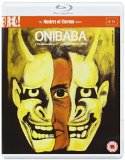 ONIBABA (Masters of Cinema) (Blu-ray) | Blu Ray | (25/02/2013)
from £13.35
| Saving you £6.64 (49.74%)
| RRP
ONIBABA (Masters of Cinema) (Blu-ray) | Blu Ray | (25/02/2013)
from £13.35
| Saving you £6.64 (49.74%)
| RRP Kaneto Shindo, one of Japan's most prolific directors, received his biggest international success with the release of Onibaba (The Demoness) in 1964. Its depiction of violence and graphic sexuality was unprecedented at the time of release. Shindo managed - through his own production company Kindai Eiga Kyokai - to bypass the strict, self-regulated Japanese film industry and pave the way for such films as Yasuzo Masumura's Mojuu (1969) and Nagisa Oshima's In the Realm of the Senses (1976). Onibaba (or Onibabaa, in its alternate spelling) is set during a brutal period in history, a Japan ravaged by civil war between rivaling shogunates. Weary from combat, samurai are drawn towards the seven-foot high susuki grass fields to hide and rest themselves, whereupon they are ambushed and murdered by a ruthless mother (Nobuko Otowa) and daughter-in-law (Jitsuko Yoshimura) team. The women throw the samurai bodies into a pit, and barter their armour and weapons for food. When Hachi (Kei Sato), a neighbour returning from the wars, brings bad news, he threatens the women's partnership. Erotically charged and steeped in the symbolism and superstition of its Buddhist and Shinto roots, Kaneto Shindo's Onibaba is in part a modern parable on consumerism, a study of the destructiveness of sexual desire and - filmed within a claustrophobic sea of grass - one of the most striking and unique films of Japan's last half-century, winning Kiyomi Kuroda the Blue Ribbon Award for Cinematography in 1965. The memorably frenetic drumming soundtrack was scored by long-time Shindo collaborator Hikaru Hayashi. The Masters of Cinema Series is proud to present Onibaba for the first time on Blu-ray in the UK. Special Features: Gorgeous New 1080p HD Transfer Full-length Director's Audio Commentary by Director Kaneto Shindo and the Stars of the Film, Kei Sato, and Jitsuko Yoshimura Video Introduction by Alex Cox 8mm Footage (40-minutes) Shot on Location by Lead Actor Kei Sato Optional English Subtitles Original Theatrical Trailer Production Stills and Promotional Art Gallery 36-Page Booklet with a New Essay by Doug Cummings - An English translation of the original short Buddhist fable that inspired the film and a statement from Writer/Director Kaneto Shindo about why he made Onibaba
![Pigs & Battleships / Stolen Desire [Dual Format Blu-ray & DVD]](/pictures/1108621.jpg) Pigs & Battleships / Stolen Desire | Blu Ray | (27/06/2011)
from £N/A
| Saving you £N/A (N/A%)
| RRP
Pigs & Battleships / Stolen Desire | Blu Ray | (27/06/2011)
from £N/A
| Saving you £N/A (N/A%)
| RRP With this his fifth film Shhei Imamura finally answered his true calling as Japanese cinema's most dedicated and brilliant chronicler of society's underbelly with the astonishing Pigs and Battleships [Buta to gunkan]. A riotous portrait of sub-Yakuza gangsters battling for control of the local pork business in a U.S. Navy-occupied coastal town (Yokosuka) Imamura conjures a chaotic world of petty thugs young love tough-headed women and underworld hypochondria with one of the most unforgettable climaxes ever to grace the screen. Featuring dynamic black-and-white 'Scope cinematography the director's typically sly sense of social commentary and a host of outstanding performances (including Jitsuko Yoshimura from Onibaba) Pigs and Battleships immediately became a cornerstone of the Japanese New Wave and remains perhaps Imamura's most sheerly entertaining work.
![Red Lion [1969]](/pictures/1003937.jpg) Red Lion | DVD | (18/06/2001)
from £N/A
| Saving you £N/A (N/A%)
| RRP
Red Lion | DVD | (18/06/2001)
from £N/A
| Saving you £N/A (N/A%)
| RRP With the winds of change sweeping through Japan overthrowing three centuries of Shogunate rule Gonzo (Toshiro Mifune) a peasant enlists in the Imperial Restoration Force which promises to reform the oppression of the past. Gonzo persuades his commander to lend him his Red Lion Mane a symbol of authority and rides into his old home town where he receives a hero's welcome. This tale both touching and hilarious traces the difficulties of a simple boastful humane man caught in the web of political intrigue. Casting a cold eye on politicians of all hues at its climax it achieves true tragic intensity.

Please wait. Loading...
This site uses cookies.
More details in our privacy policy